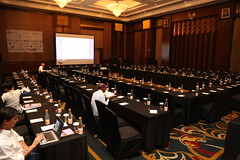SOURCE: Earth Security Group
Air pollution from haze is a serious public health concern in Singapore. The haze primarily originates in Indonesia’s forest fires that are used to clear land for agriculture. Singapore will be increasingly pressured to act to reduce air pollution as health risks undermine the quality of life of its population and its ambition to be a leading global commodities hub. Indonesia’s new president Joko Widodo has made poverty-reduction the centrepiece of his term’s vision. Forest fires affect the health of Indonesian rural communities and undercut his presidential pledge, resulting in his recent pronouncement against mono-crop corporate agriculture.
Adding to the complexity is the contestation of land tenure in Indonesia, a major obstacle to clarifying responsibility for forest fires. The future position of companies listed in Singapore and Malaysia is threatened, particularly given Indonesia’s desire to limit foreign land ownership. In this web of political complexity, concession permits for large palm oil, paper and timber companies in Indonesia will be increasingly scrutinised, despite over 50% of fire alerts originating outside concessions. Companies that have made public commitments to ‘zero burning’ and ‘zero deforestation’ have the most at stake, as they will not be able to deliver on their commitments without decisive government action.
Strategic Opportunity 1
For companies with land concessions in Indonesia
Companies that have made public commitments to zero deforestation and burning, to help fill the gap that exists for robust and uniform transparency, disclosure and the development of a land monitoring system for use by public policy makers’ and the private sector.
Strategic Opportunity 2
For the government of Indonesia
Encourage Indonesia’s own legal schemes for sustainable palm oil and wood products The Indonesian Sustainable Palm Oil (ISPO) system, and the Indonesian Timber Legality Assurance System (SVLK) to directly address the haze issue through coordinated independent verification of certified plantations for compliance with no-burning policies.
Strategic Opportunity 3
For the governments of Singapore and Malaysia
Quantify the economic and health costs that forest fires in order to make more informed political decisions about its impacts. Accelerate the development and implementation of disclosure and transparency guidelines for companies listed in their stock exchanges or privately held in their jurisdictions that operate large land assets in Indonesia.
Strategic Opportunity 4
For ASEAN policy-makers
ASEAN has the goal to strengthen regional economic integration in 2015. The existing ASEAN Business Advisory Council has a role to play in driving the effectiveness of the ASEAN Agreement on Transboundary Haze Pollution. The creation of an ‘ASEAN Business Working Group on Transboundary Haze’ is an opportunity to consolidate the business voice across these countries regarding policy priorities and implementation.
ASEAN’s agreement: a foundation for trans-boundary cooperation
The Agreement on Transboundary Haze Pollution is a regional treaty signed by 10 ASEAN countries (Brunei, Cambodia, Laos, Malaysia, Myanmar, Singapore, Thailand, Vietnam and Indonesia) that came into force in 2003. Indonesia only ratified the treaty on 16 September 2014. The agreement requires parties to develop and implement prevention, monitoring and mitigation measures, respond to information requests made by affected states, and take legal or other measures to implement obligations under the agreement.ASEAN cannot sanction parties that fail to comply with its provisions and parties have significant leeway in how to meet their obligations. Greater transparency and exchange of technical information, such as concession maps, is essential, but Indonesia argues that the disclosure of concession maps is in contravention with its laws. Intergovernmental cooperation has been limited to Ministries of the Environment, with weak coordination with other ministries responsible for key areas of the economy, finance and industry or with other strategic areas of ASEAN’s agenda on economic integration, food security and agriculture.
Indonesia
Forest fires undermine the government’s rural development goals
In 2013, Indonesia ranked as the top producer of palm oil in the world (28.4 MT) as well as the largest global consumer of palm oil, accounting for 23% of global consumption. Top importers of Indonesian palm oil are India (28%), China (15%) and Malaysia (8%), reducing the effectiveness of western market led sustainability certifications. Globally, Indonesia is the 10th largest paper and paperboard producer and home to APP, the largest company in the global market. Illegal burning for oil-palm and pulpwood plantations has had devastating effects domestically, where haze has caused hundreds of schools and local airports to close, and respiratory infections in thousands of people.
Malaysia
Malaysia chairs ASEAN in 2015
Malaysia holds the chair of ASEAN in 2015: Malaysia is now the second largest producer of palm oil (19.2 MT in 2013) after Indonesia and the 5th largest consumer of palm oil. Primary importers of Malaysian palm oil are China (19%), India (15%), and Pakistan (8%). While Malaysia is not currently a significant player in the global market for pulp and paper, the sector is poised to expand. Malaysia is itself responsible for some haze episodes, but it is the prevailing westward winds carrying the haze pollution from Indonesia as far north as Kuala Lumpur that can push air pollution above the level considered hazardous. In 2013, Malaysia’s Air Pollutant Index (API) reached ‘hazardous’ levels around the capital, closing airports and schools, and a state of emergency was called in Johor State.
Singapore
Health and business disruption costs in a global commodities hub
Many of the region’s most significant palm oil, pulp and paper and timber companies are domiciled or listed in Singapore, an increasingly significant global commodities hub that supports trade and financing in both sectors. While Singapore has effective plans and policies in place to manage its dependencies on food, water and energy imports, it is increasingly exposed to health and economic impacts from transboundary haze. At the height of the 2013 haze crisis, record air pollution in Singapore was classified as hazardous to human health, damaging Singapore’s reputation as an attractive business and financial hub renowned for its high quality of life.






